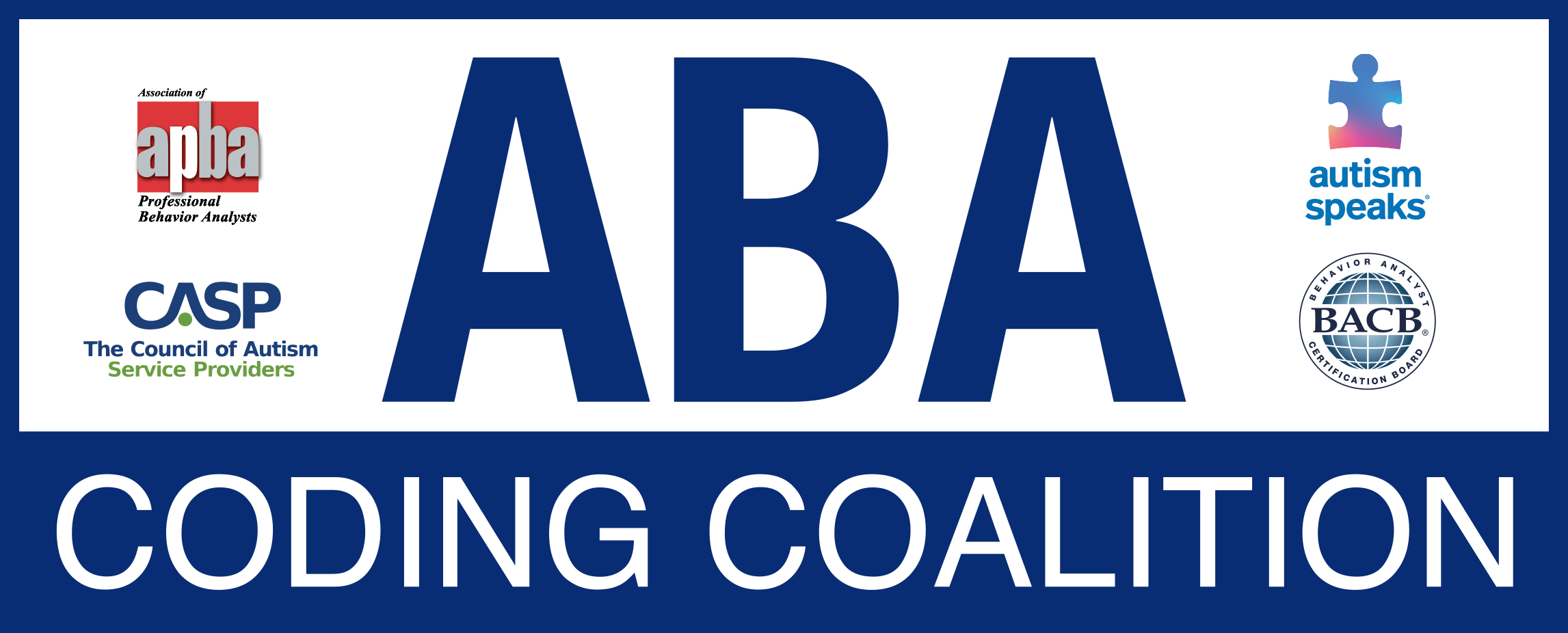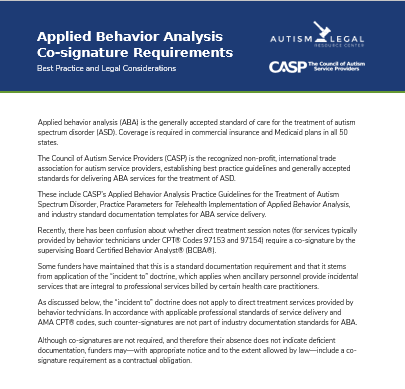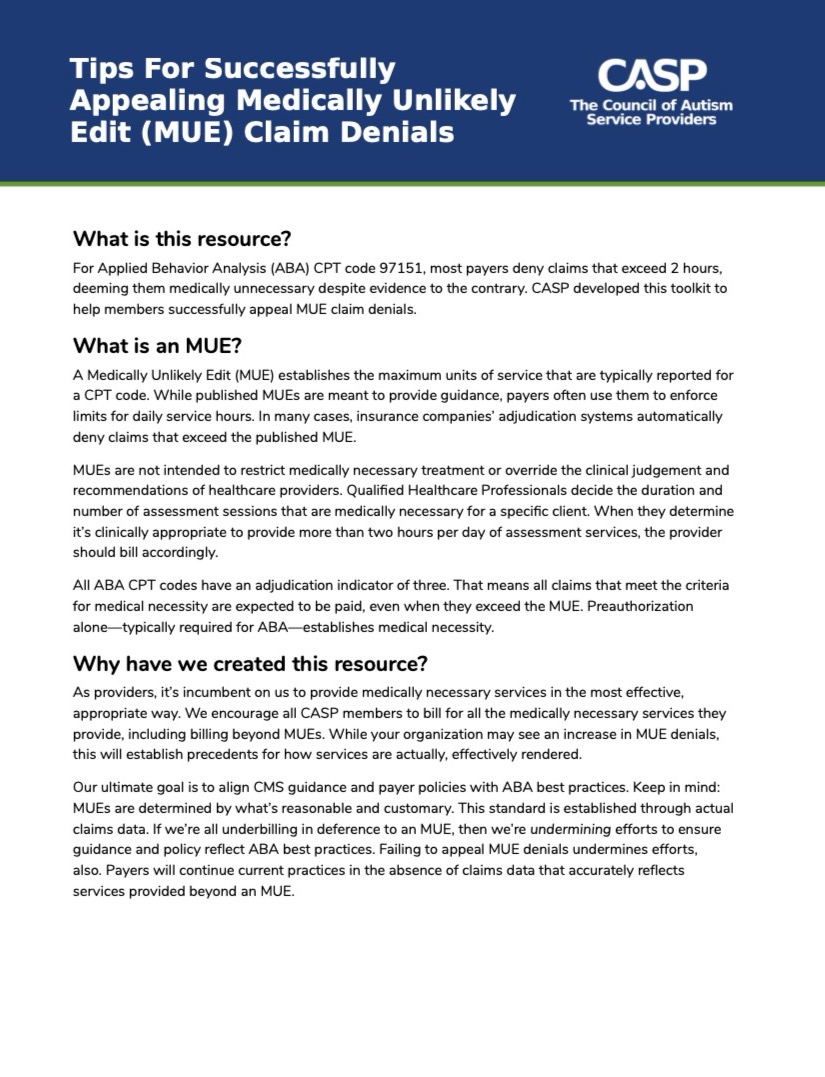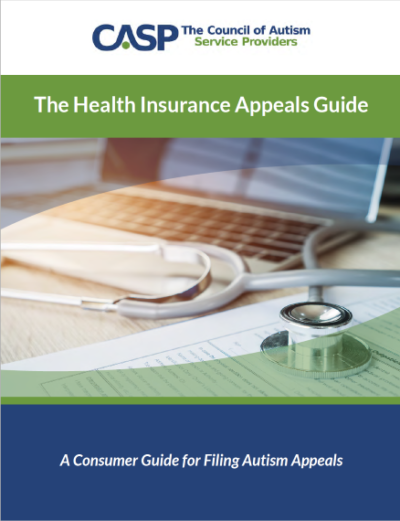Health Insurance Resources
Session Note Templates
50-State ABA Medicaid Benefit Comparison
Foreword
Health insurance played almost no role in the treatment of autism before the turn of the century. Although autism was (and still is) a health condition diagnosed by a physician or psychologist pursuant to the Diagnostic and Statistical Manual of Mental Disorders, the health insurance industry left to other systems the financial burden of autism treatment.
All of that changed with the enactment of autism insurance mandate laws throughout the first two decades of the 21st century. States mandated that health insurers bear the costs of evidence-based autism treatment for an individual properly diagnosed by a physician or psychologist. This autism insurance reform movement reshaped the entire landscape of autism treatment, in particular Applied Behavior Analysis (ABA), by framing the funding of treatment in terms of medical necessity. Autism service providers learned a new language, created new “insurance manager” positions within their businesses, and embraced a whole new way of thinking about funding for autism services.
In this environment, the importance of understanding and pursuing appeals of denied claims
has never been greater. A successfully appealed claim can make the difference between ongoing treatment for an individual with autism and unreached potential due to an inability to afford treatment. With a keen understanding of the importance of insurance appeals to families and providers, The Council of Autism Service Providers releases this Guide to set forth clear information that consumers and treating providers need to know when appealing denials of autism services. This Guide was written by leading health insurance experts to help educate individuals about their appeal rights and explain the steps in the appeals process.
As part of the efforts to promote health equity, federal and state regulations have been adopted to promote due process for patients who have been denied care because an insurer will not authorize medically necessary coverage or has otherwise made adverse benefit determinations. Unfortunately, the goals of the insurance appeals process are undermined when patients and their treating providers are not aware of their appeal rights and how to best leverage the internal and external appeals systems to try to get medically necessary care covered. Even when patients and providers understand their appeal rights, health plans may still uphold their denial of care.
In addition to this Guide, CASP offers training that further providers’ understanding of the appeals process when there is a denial of care for autism. More information is available on the CASP website.
A special thanks to The Kennedy Forum, Denials Management and Schooner Strategies for helping develop this Guide. If you would like to file a parity complaint, please go to www.parityregistry.org.
Please also see CASP’s other resources for providers, funders, and families, which include the CASP ASD Practice Guidelines for Healthcare Funders and Managers, and the CASP Practice Parameters for Telehealth Implementation of Applied Behavior Analysis.
Lorri Unumb, Esq. Chief Executive Officer

The ABA Coding Coalition comprises representatives of three of the organizations (Association of Professional Behavior Analysts, Autism Speaks, Behavior Analyst Certification Board) and a consultant who participated in the workgroup that developed the application to the American Medical Association CPT® Editorial Panel that resulted in the code set for adaptive behavior (applied behavior analysis) services that went into effect January 1, 2019. That code set includes eight Category I and two Category III CPT® codes modified from the Category III (temporary) codes for adaptive behavior services that were issued in 2014 pursuant to a process initiated by the Association for Behavior Analysis International (ABAI). The workgroup, which included representatives of ABAI and operated from 2015 through the end of March 2019, also developed resources to assist providers and payers with implementing the 2019 code set. The principal representative (Lorri Unumb) for the fourth organization in this Coalition (Council of Autism Service Providers) represented Autism Speaks in the previous work group.
The principal aims of the ABA Coding Coalition are to:
- support implementation of the 2019 CPT® code set by ABA service providers and payers by responding to inquiries, developing and disseminating information and resources, and communicating with our constituents and other interested parties
- monitor Medically Unlikely Edits (MUEs) for the code set and submit requests for revisions based on provider feedback and payer implementation
- educate ABA service providers and payers about CPT®, MUE, and related processes
- develop and maintain this website as a repository for coding and reimbursement resources and a portal for inquiries
The ABA Coding Coalition’s operating policies and procedures are described here.
Mariel Fernandez and Kristen Koba-Burdt are CASP's principal and alternate representatives, respectively.
Background
In recent years, several Medicaid agencies, Medicaid Managed Care Organizations (MCOs), and commercial health insurance payers have introduced co-signature requirements for applied behavior analysis (ABA) session notes. These requirements are often outlined in payer ABA policies, specific documentation guidelines, or emerge as part of feedback during pre- or post-payment claims reviews and audits.
The co-signature requirement may vary. In some cases, it mandates that an authorized Qualified Healthcare Professional (QHP) co-sign all session notes for services rendered to any client on their caseload (e.g., for all 97153 or equivalent sessions). In other cases, the requirement stipulates that the parent or legal guardian co-sign all session notes for services provided on a given day (e.g., for all billable services related to the full adaptive behavior code set). CASP's session note templates do not currently include a section for co-signatures. Many ABA providers have expressed concerns regarding this omission.
This white paper, developed by the Autism Legal Resource Center and the Council of Autism Service Providers (CASP), explores legal considerations and best practices surrounding co-signature requirements.
Central to the discussion are topics such as the requirements for “incident to” services, whether these standards apply to ABA, contractual obligations, the Wellstone-Domenici Mental Health Parity and Addiction Equity Act (MHPAEA), and payer statements surrounding co-signatures to prevent fraud, waste, and abuse as well as enhance case management and direction activities.
Use
This guidance is intended to help ABA organizations advocate for the removal of co-signature requirements. Organizations focused on public policy and advocacy may use this white paper to push for policy changes that align documentation requirements with generally accepted standards and are consistent with the legal arguments outlined within.
Legal Disclaimer
This document should not be construed as legal advice. Organizations or individual providers should not stop complying with existing payer or regulatory requirements without obtaining written agreement from the relevant entity. ABA providers may wish to consult legal counsel to assist them through this process.
What is this resource?
For Applied Behavior Analysis (ABA) CPT code 97151, most payers deny claims that exceed 2 hours, deeming them medically unnecessary despite evidence to the contrary. CASP developed this toolkit to help members successfully appeal MUE claim denials.
 What is an MUE?
What is an MUE?
A Medically Unlikely Edit (MUE) establishes the maximum units of service that are typically reported for a CPT code. While published MUEs are meant to provide guidance, payers often use them to enforce limits for daily service hours. In many cases, insurance companies’ adjudication systems automatically deny claims that exceed the published MUE.
MUEs are not intended to restrict medically necessary treatment or override the clinical judgement and recommendations of healthcare providers. Qualified Healthcare Professionals decide the duration and number of assessment sessions that are medically necessary for a specific client. When they determine it’s clinically appropriate to provide more than two hours per day of assessment services, the provider should bill accordingly.
All ABA CPT codes have an adjudication indicator of three. That means all claims that meet the criteria for medical necessity are expected to be paid, even when they exceed the MUE. Preauthorization alone—typically required for ABA—establishes medical necessity.
Why have we created this resource?
As providers, it’s incumbent on us to provide medically necessary services in the most effective, appropriate way. We encourage all CASP members to bill for all the medically necessary services they provide, including billing beyond MUEs. While your organization may see an increase in MUE denials, this will establish precedents for how services are actually, effectively rendered.
Our ultimate goal is to align CMS guidance and payer policies with ABA best practices. Keep in mind: MUEs are determined by what’s reasonable and customary. This standard is established through actual claims data. If we’re all underbilling in deference to an MUE, then we’re undermining efforts to ensure guidance and policy reflect ABA best practices. Failing to appeal MUE denials undermines efforts, also. Payers will continue current practices in the absence of claims data that accurately reflects
services provided beyond an MUE.



